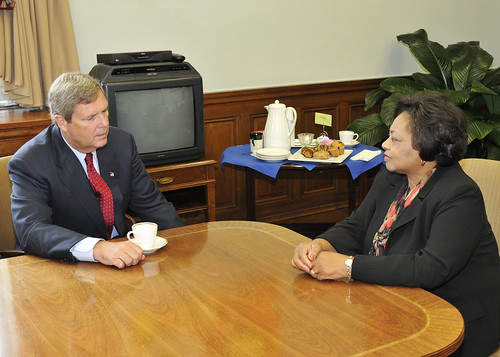Before I was sworn in as Secretary of Agriculture, I took time to meet with a handful individuals who held the job before I did. I asked them for advice, and two recent Secretaries mentioned that it was important that I focus on civil rights. As I soon learned for myself, USDA has an unfortunate and checkered history with regards to civil rights, with a multi-decade history of discrimination against our customers and our employees.
So since becoming Secretary in January 2009, I have made civil rights a priority at USDA, working to turn the page on the Department’s tragic civil rights record. I pledged that we would correct past errors, learn from mistakes, and take definitive action to ensure that there is no disparity in program benefits based on race, color, sex, age, sexual orientation or disability.
Over the past 20 months, I have implemented a comprehensive program to move us into a new era as a model employer and premier service provider. And I made it clear to every employee that USDA will have zero tolerance for any form of discrimination, and that each employee and customer must be treated fairly and equitably, with dignity and respect. We have made substantial progress towards these goals, and civil rights will remain a priority at USDA until we have truly moved into the new era I envision.
But for our work on civil rights to be successful and lasting, it must be part of a broader cultural change at USDA. We began this process last year when I created a task force to build a more open, responsive, collaborative, transparent, and effective USDA.
So there is irony in the fact that my commitment to civil rights was a factor in the run-up and decision to ask for and accept Shirley Sherrod’s resignation as USDA State Director for Rural Development in the State of Georgia.
Following that incident, I directed the USDA Acting General Counsel to conduct a review of what took place. I wanted to determine what mistakes were made to ensure that the USDA could learn from the incident and avoid similar pitfalls in the future.
Today, I met with Mrs. Sherrod to discuss, among other things, the review we completed of this incident and how USDA will be moving forward to address the recommendations it contains.
This review identified a handful of significant lessons. Among them is that we need to improve protocols for internal communications at the Department, and create a set of safeguards to avoid the sort of hasty action which led to the mishandling of the matter with Mrs. Sherrod. I have accepted all of these recommendations and asked that they be implemented immediately. I know that they will help us build a more inclusive and deliberative decision-making environment and prevent similar mistakes from occurring again at USDA.
This experience provides an opportunity to learn from our mistakes. But it also provides an opportunity to build a Department that empowers and respects its employees and customers. And at the end of the day, I know that we will build a stronger Department and better serve the American people.

